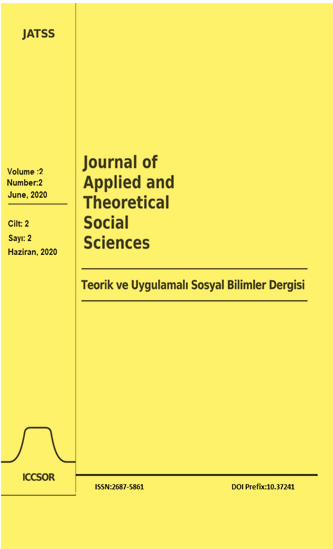Sosyal Devlet Kapitalizmin Anti-Tezi Mi?
Özet
Keynesyen düşünce sisteminde temellerini bulmuş olan Sosyal Devlet Politikaları İkinci Paylaşım Savaşı ertesinde uygulamaya koyulmuş olup, 1970’lerin ortalarına kadar devam etmiştir. Her ne kadar amaç, ekonomi ve politika karışımı yoluyla, eşitlikçi bir toplumsal yapı oluşturmak idi ise de, ekonominin tartışılmaz gücü karşısında koşulların değişmesi ile politik önlemler ters dönmüş ve sermaye gücü ekonomide ve politika alanında başat olmuştur. Çok değerli olan bu tarihsel deney göstermiştir ki, emek piyasasında sermayenin hakimiyeti önlenmedikçe ve emeğe üretim ve dağıtım mekanizmalarının her kademesinde yer verilmedikçe, sistemi meşrulaştırmak için geçici bazı önlemlerin alınması olası olmakla beraber, kalıcı adil bir toplumsal yapı oluşturulması olanaksızdır ki, Marks’ın Keynes’e üstünlüğü burada ortaya çıkar.
##plugins.generic.paperbuzz.metrics##
Referanslar
Althusser, L (1971), Lenin and Philosophy and Other Essays, New Left Books, London
Barrow, Clyde W. (1993), Critical Theories of the State, The University of Wisconsin Press, USA
Blaug, Mark (1995), Economic Theory in Retrospect, Cambridge University Press, USA
Dardot, Pierre & Christian Laval (2012), Dünyanın Yeni Aklı: Neoliberal Toplum Üzerine Deneme, İstanbul Bilgi Üniversitesi Yayınları
Friedman, Milton (1993), A Monetary History of the United States of America, Princeton University Press, Princeton, USA
Galbraith, James K. (2012), Inequality and Instability, Oxford University Press, New York
Jessop, Bob (1982), The Capitalist State: Marxist Theories and Methods, New York University Press, New York
Jessop, Bob (1990), State Theory: Putting Capitalist State in Their Place, Polity Press, Cambridge, UK
Jessop, Bob (2016), The State: Past, Present, Future, Polity Press, Cambridge, UK
Galbraith, J. Kenneth (1980), The Great Crash 1929, Penguin Books, UK
Keynes, John Maynard (1960), The General Theory of Employment, Interest, and Money, MacMillan & Co Ltd, London
Klein, Lawrence W. (1959), The Keynesian Revolution, The MacMillan Company, New York
Krugman, Paul (2009): The Return of Depression Economics, W.W.Norton & Co. New York
Lerner, Abba P. (1964), The Economics of Control, The MacMillan Company, New York
Marks, Karl (2011), Kapital, cilt I, II, III, Yordam Kitabevi, İstanbul
Mattick, Paul (1974), Marx & Keynes, Merlin Press, London
Milanovic, Branko (2016), Global Inequality, The Belknap Press of Harvard University, London
Miliband, Ralph (1969), The State in Capitalist Society, Wiedenfeld & Nicolson, London
Minsky, Hyman P. (1986), Stabilizing an Unstable Economy, Mc Graw-Hill, New York
Musgrave, Richard A. (1959), The Theory of Public Finance, Mc Graw-Hill, New York
O’Connor, James (1973), The Fiscal Crisis of the State, St Martin’s Press, New York DOI: https://doi.org/10.1007/978-1-349-06273-7
Offe, Claus (1984), Contradictions of the Welfare State, The MIT Press, Cambridge, Massachusetts, USA
Plant, Raymond (2012), The Neo-Liberal State, Oxford University Press, Oxford, UK
Poulantzas, Nicos (1978), Political Power and Social Classes, Verso, London
Robinson, Joan (1966), An Essay on Marxian Economics, MacMillan, London DOI: https://doi.org/10.1007/978-1-349-15228-5
Stiglitz, Joseph E. (2012), The Price of Inequality, W. W. Norton & Company, New York
Tansel, Cemal Burak, ed. (2017), States of Discipline, Rowman & Littlefield, New York
Therborn, Göran (1999), The Ideology of Power and the Power of Ideology, Verso, London
Webber, Carolyn & Aaron Wildavsky (1986), A History of Taxation and Expenditure in the Western World, Simon and Schuster, New York
Weber, Max (1946), “Class, Status, and Party”, Max Weber: Essays in Sociology, ed. Hans G. Gerth and C. Wright Mills, Oxford University Press, New York






















